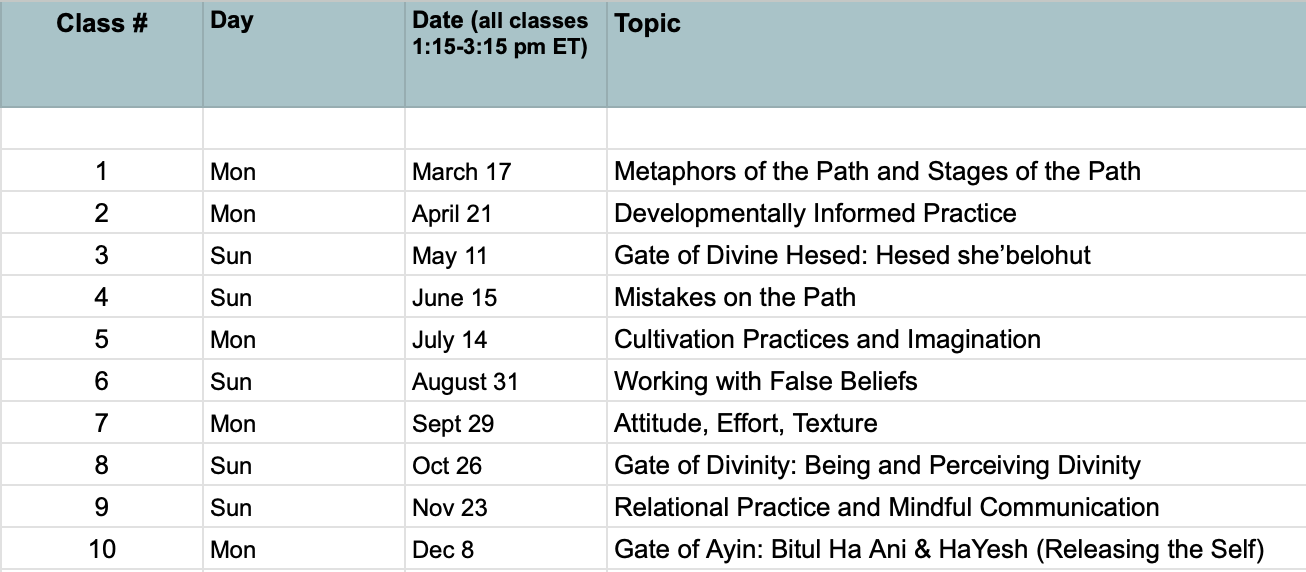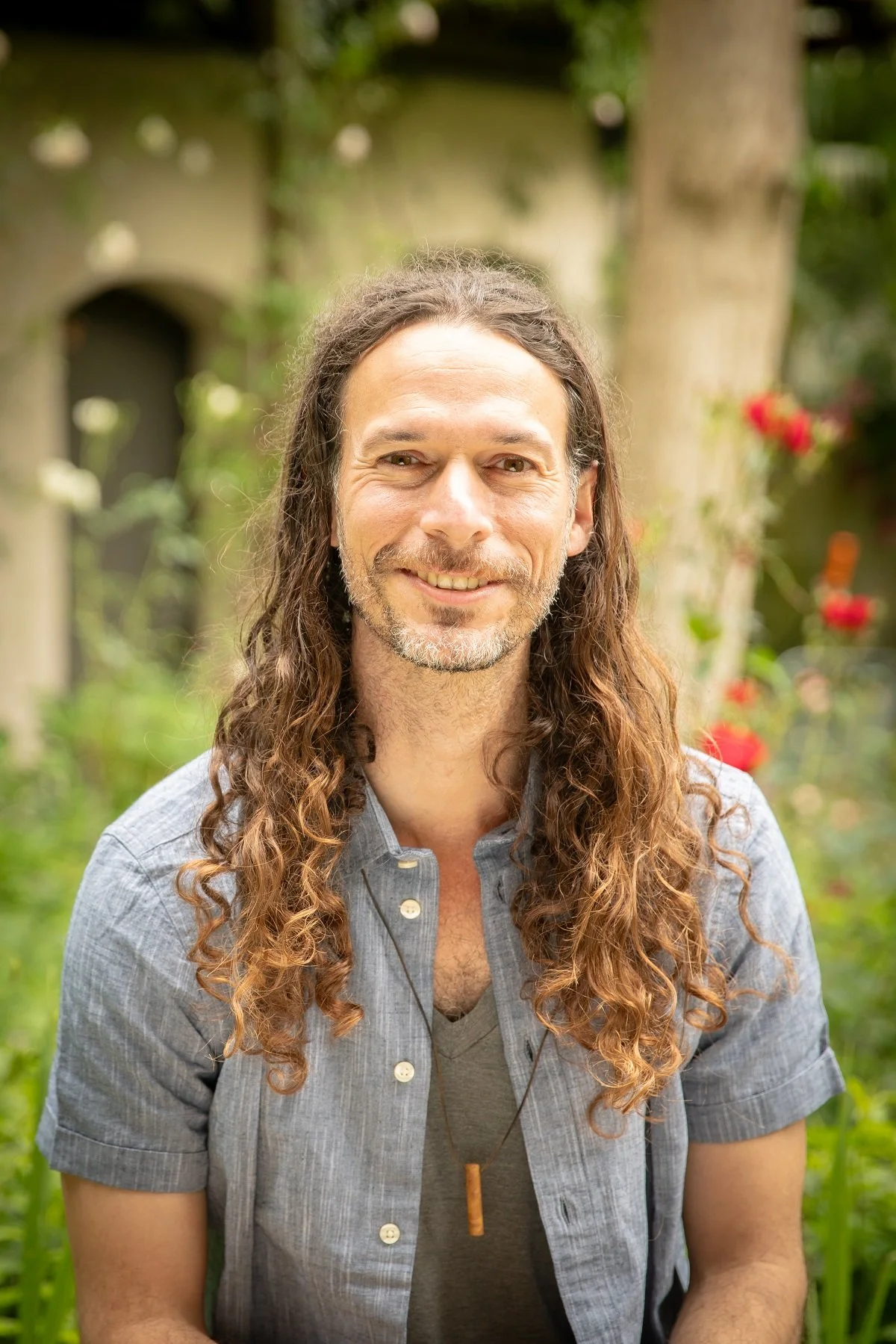
Hod
Deepening Practice and Learning
Hod is an opportunity to continue to deepen your practice and learning in a systematic way based on the Four Gates model that you have experienced in Yesod, Nezah or Tiferet.
Hod will profoundly enrich your practice and understanding and introduce you to more advanced forms of practice. Hod is open to those who have completed the Tiferet or Nezah programs. In Hod you will continue the personal learning and growth of the first two years of learning without the teacher training aspect of Keter. It is an opportunity to deepen your learning and practice while continuing to be in the supportive community of Tiferet or Nezah.
Structure: What You’ll Receive and What You’ll Do
10 monthly live meetings that provide a deeper dive into the four Gates of Awareness and will be roughly structured in a similar way to the Yesod meetings.
10 Guided video/audio meditations and teachings
Guidance for partnered and individual learning and practice
You’ll continue your hevrutah learning and personal practice.
Community discussion board for continued sharing and exploration outside of class
Curriculum
Hod will continue and deepen the work of Tiferet and Nezah.
Hod will continue to explore and deepen our meditation practices, adding new depths to our practice and spending more time in the realms of the Gate of Divinity and the Gate of Emptiness. Hod will provide deep frameworks for practice and its development. This will include an important focus on the development of practice over time and how we understand and make possible the deepening and growth of our practice.
These topics will include:
Metaphors of the Path and Stages of the Path: Deepening our understanding of metaphors for practice and the developmental stages of practice.
Understanding various metaphors for the nature of our practice and clarifying and discerning your own central metaphors as a practitioner.
Understanding the stages of the path for your own practice and development.
Detours and Mistakes on the Path: Identifying a range of meditation mistakes and misunderstandings experienced by practitioners. Learning how to most effectively guide ourselves out of these misunderstandings.
Relational Practice and Mindful Communication: Exploring various practices and orientations to mindful communication and relationality.
That the kodesh ha'hakodeshim (holy of holies) was framed in the relational space of two cherubs points us to the potency of sacred relationality. We'll explore approaches that bring practice into the interpersonal space and how they can play a role in our lives and practice.
Developmentally Informed Practice: Understanding human development and how it informs our practice and spiritual development.
So much of what we struggle with and get way laid with along our path has to do with the lasting impact of our formative years, the ways our physiology, identity, emotions, behavior, and relational habits take shape as a result of developmental trauma. We'll explore what's needed for healthy development, what happens when key developmental needs and tasks aren't met and completed, and what we can do to help ourselves reconnect to the original movement of our lives as practitioners and human beings.
Working with False Beliefs: Developing effective practices to free ourselves from false beliefs.
False beliefs, or limiting beliefs, are unskillful fabrications that perpetuate suffering. We'll explore a variety of approaches in our own practice to work through these beliefs and to root our being and psyche in more fertile, wholesome soil.
Attitude, Effort and Texture: Exploring the deep importance of the texture and attitude we bring to practice as a practitioner and teacher, foregrounding issues and qualities such as curiosity, surrender, playfulness and right concentration.
Cultivation Practices and Imagination: Developing an understanding of cultivation practices and how they work and the role of imagination in our practice.
We'll present and use a clear framework for cultivation practices and the skillful use of imagination in the shaping of our reality.
Gate of Elohut/Divinity:
Being and Perceiving Divinity. We’ll work with practices that help us perceive the divine nature of ourselves and the world.
Gate of Ayin/Emptiness:
Bitul Ha Ani & HaYesh (Releasing the Self): We’ll learn techniques for a deeper release of our sense of boundedness and separation that can open up new vistas as both a practitioner and teacher.
Gate of Divine Hesed: We’ll explore a variation on familiar lovingkindness/blessing practice, but where we tune in to the Divine grace and to ourselves as channels or conduits for that Hesed.
Course Requirements
Regular attendance at classes
Viewing the video recording of any class you are not able to attend before the next class.
Daily practice of at least 20 minutes
Text preparation for each class
Monthly hevrutah (partnered learning) to study assigned texts and do assigned practices
Meeting more regularly with your hevrutah is warmly encouraged.
Reading assigned articles for class
Goals and Learning Outcomes
Learning Outcomes: Participant will emerge having learned and been exposed to:
Deeper understanding and practice of meditation and Jewish mindfulness.
Expanding on the Tiferet and Nezah curriculum to introduce new perspectives, texts and practices.
Particular emphasis on more advanced practices and training our view in the Gates of Divinity and Emptiness.
Deepening previous topics and practices
Refining practices and understandings
Deepening an understanding of the unfolding of practice over time including gradual and direct paths.
Community
Being part of a community of dedicated serious advanced practitioners
Creating a community of colleagues for your ongoing practice.
Building a resource bank
Entry Requirements
Completion of Nezah or Tiferet
Schedule
Here is our schedule of meetings for Hod.
Particular class topics and orders may change
Faculty
Rabbi James Jacobson-Maisels Ph.D.
Rav James is the founder and spiritual director of Or HaLev: Center for Jewish Spirituality and Meditation. He has been studying and teaching meditation and Jewish spirituality for more than twenty five years. He received his Ph.D. in Jewish Studies from the University of Chicago and rabbinic ordination from Rabbi Daniel Landes, the Rosh Yeshivah of Pardes and from the Beit Midrash for an Israeli Rabbinate, a pluralistic ordination for Jewish leaders in Israel. He was the founding Rosh Yeshiva of Romemu Yeshiva and has taught and innovated programs in Jewish thought, mysticism, spiritual practices and meditation at the Pardes Institute of Jewish Studies, Haifa University, Yeshivat Hadar and in a variety of settings around the world. He strives to integrate his study and practice and to help teach and live Judaism as a spiritual discipline.
Daniel Yoel Cohen (Danny)
Danny is a founding member and senior teacher at Or HaLev. He is also a skilled teacher and facilitator of transformative change processes, Nonviolent Communication, and mindfulness-based experiential psychotherapy. He teaches and learns at various institutions and companies both in Israel and around the world.
Tuition
There are 4 tuition levels for the program:
Additional scholarships are also available.
Registration
If you are a graduate of Nezah or Tiferet, you can register for Hod here.
Please reach out to James at james@orhalev.org with any questions.
We so look forward to continuing this deep journey together
Any questions? Please email Or HaLev English Language Coordinator, Naomi Shifrin, at naomi@orhalev.org




